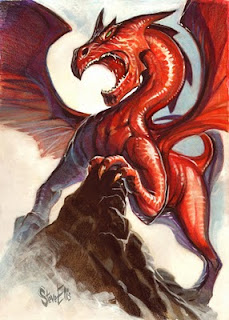Frankenstien Part 1. The construction of the monster
Hey everyone, I wanted to share the details of my thought process on how I put together the painting for Mary Shelley's Frankenstien I posted last week.
Check out my deviant art site at steve-ellis.deviantart.com
When I started this piece I didn't want to do the green cartoon monster, this is the creature
right out of Mary Shelley’s Frankenstein: The Modern Prometheus, the first horror novel ever written. It is an intense piece of previctorian literature. The Monster in
Frankenstein is articulate, intelligent, lithe, and angry with his creator for rejecting
him. In this picture, he is
crouching in the mountains and waiting for the right moment to enact revenge.
While I could describe the monster for you, Shelley wrote it
best: his hair was of a lustrous black, and flowing; his teeth of a pearly
whiteness; but these luxuriances only formed a more horrid contrast with his
watery eyes, that seemed almost of the same colour as the dun-white sockets in
which they were set, his shriveled complexion and straight black lips… Oh! No
mortal could support the horror of that countenance.
Gesture/ personality
through movements
He is alone, and I want to stress that by composing the
mountains to create the sense of space that implies loneliness. Draw his
gesture with a lot of tension; think of a rubber band held tightly ready to release.
Every line of the gesture should work against the last line. The shoulders are contraposto to the
hips. The head turns slightly downward so he’s looking at us through his
eyebrows, increasing the menace.
Composition
In
this case we’re creating a falling composition. The mountain at the upper left
leads your eye into the picture throught the figure then through the monster’s
face and hand down to the mountain and out of the page on the opposite
corner. Within the piece, the
creature’s hand with the highlights at the wrist point right into the face,
bringing the attention right where we want it. The torso and legs are mostly less important compositionally
except to act as a dark base for the light figure area to rest upon.
Basic Construction of Figure
He is created by a human, assembled from multiple
bodies, something’s going to look wrong. The parts might look out of proportion
to each other and some of the muscles might be twisted as if they are attached
strangly. This doesn’t mean you
can ignore anatomy, your monster will be far more believable if you drea real
anatomy then twist it a bit. Pay
more attention to the shoulders and arms since they are in the light and need
to be drawn more carefully than the lower half of the body.



Comments